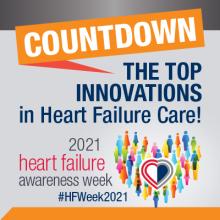
This post was developed as part of the Heart Failure Awareness Week 2021 Heart Failure Top Innovations Countdown.
Submitted by Stormi Gale, PharmD, BCCP, Assistant Professor, University of Maryland School of Pharmacy @stormigale
While many of us are getting tired of the word “unprecedented”, the past year has certainly been exceptional in terms of advances in heart failure therapies. As a pharmacist specializing in heart failure, I am particularly excited about some of the medications that have shown promise in the treatment of this disease.
Dapagliflozin and Empagliflozin – not just for diabetes anymore!
Of all the recent developments, the role of “SGLT2 inhibitors” (e.g., dapagliflozin , empagliflozin) is most exciting to me. Interestingly, these medications themselves are not actually new. In fact, you or someone you know may be on this medication for diabetes, which is what it was originally studied for. Luckily, we started to notice how beneficial these medications were for patients with heart failure with reduced ejection fraction (HFrEF). In particular, these medications have been shown to make patients with HFrEF feel better, live longer, and stay out of the hospital. They are also helpful for keeping your kidneys working well and have very minimal side effects. Because of this, we now use these medications for patients with HFrEF, regardless of whether they have diabetes! Studies in patients with preserved ejection fraction are not finished yet, but our community remains hopeful that these medications may benefit this type of heart failure as well.
Patients should not take this medications on “sick days” where they aren’t eating or drinking much. Patients who are on these medications should also practice good genital hygiene, as these medications can increase the risk of genital infections, although this is rare. Unfortunately these medications are brand-name only, so they are quite expensive. The good news, however, is that they are already covered by a lot of insurances, and that copay cards and patient assistance programs are available for those who qualify. If you aren’t sure how to afford your medications, be sure to talk to your provider or pharmacist about your options!
IV iron supplementation
A second exciting medication is intravenous (IV) iron. Approximately half of patients with heart failure also have low iron, and we now have studies showing the benefits of IV iron in these situations. Iron given via IV has been shown to make patients with heart failure feel better and keep them out of the hospital! Unfortunately, the body does not digest iron pills very well, so taking iron supplements by mouth may not have the same effects. Patients can be given IV iron during a hospitalization or in a clinic or infusion center. Depending on the type of iron used, patients may require multiple doses to get fully treated.
New medications specifically for HFrEF
Two additional medications for HFrEF to come out of 2020 were vericiguat and omecamtiv mecarbil. Vericiguat was actually just approved by the FDA earlier this year. Omecamtiv has not yet been approved. Importantly, vericiguat cannot be used during pregnancy and should not be used if you are taking nitrates (e.g., nitroglycerin, isosorbide dinitrate or mononitrate). Otherwise either of these medications may be added to “core” heart failure therapies to reduce the risk of worsening heart failure/hospitalization.
Overall, it is a very promising time for heart failure medications. If you have questions about you or your loved ones medications or how these new developments may apply to them, please be sure to talk to your provider or pharmacist!
Disclaimer: The statements and views expressed in this post are those of the author and do not necessarily reflect the opinions or recommendations of the Heart Failure Society of America. Furthermore, HFSA does not endorse any medications or treatments discussed herein.
